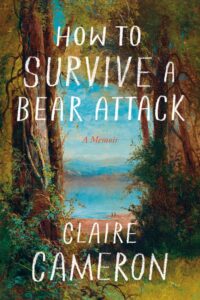April 3, 2025
How to Survive a Bear Attack, by Claire Cameron
I never read Claire Cameron’s 2014 novel The Bear. My kids were 5 and 1 when the book came out, and at the time (and even now) I felt far too tender to contend with a story in which parents are killed in a bear attack and their small children are left to fend for themselves in the wilderness. Not unrelated to the arrival of my children OR my aversion to reading the story was also an anxiety that had settled into my consciousness like a fug and years later would knock me totally flat. (It’s curious to read my first novel and see it there, when my protagonist takes in the big old trees in her neighbourhood, and how vulnerable she is to dangerous objects falling from the sky, how vulnerable even her home is, and that safety is an act of faith more than it’s ever a fact). But that same anxiety, which I’m learning to live with and understand better, was absolutely why I very much wanted to read Cameron’s latest book, the memoir How to Survive a Bear Attack. Because it’s a book about anxiety and fear, and living with them both, and the fact that maybe we’ll even be strong enough when we have to step up to fight, but we can’t plan these things, and the danger is never quite where we imagine it will be.
Cameron’s father died of skin cancer when she was nine-years-old, and in the years after, she found her way back to herself, and through the weight of her grief, by immersion in the great outdoors. She became an avid canoeist, wilderness trekker, rock climber, tree planter, finding solace in nature and wildness, and also power in her own strength and abilities to succeed at the challenges the wilderness threw up at her, including run-ins with bears. She even fancied that she’d know what to do if the unlikely event of a bear attack occurred. Such attacks were rare, but Cameron she was interested in stories of these outliers, like the Canadian couple killed in Algonquin Park in 1991. Understanding what happened to them became an insurance of sorts, because if she could just figure out what they’d done wrong and do it differently, then she would be fine. It was also gateway to her literary breakout, with her second novel’s great success.
But when the danger finally arrived, it came from a place that Cameron had never seen coming. At 45, she was diagnosed with skin cancer, and learned she had a rare genetic mutation making her especially susceptible. She was advised by her doctor that her optimal UV exposure was precisely none. Facing her own mortality brought her back to her memories of her father, a professor of Old English, and the stories he’d taught and shared with her of monsters and dragon slaying. She calls on his courage and strength to help get her through her diagnosis, and many surgeries, and also begins to consider anew the story of the couple killed in Algonquin Park all those years ago. What had she missed from the story the first time? What other lessons might there be? How was she to find her home in nature again when parts of her life she’d always taken for granted—paddling in the sunshine on a lake that reflects the light like a mirror, for instance—had suddenly become perilous. And what of the bear itself? Where, exactly, was the heart of this story?
I tore through this memoir in a day, absorbed by every thread in this multifaceted narrative. The bear stuff BLEW MY MIND and Cameron’s own journey is gorgeously and emotionally wrought, and I came away with just the kind of perspective I’d been hoping to get. “Being alive is one big risk and it will end in death, but the bridge between those two things is love.”






